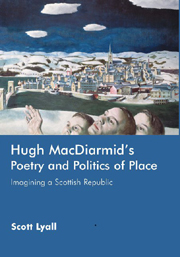Book contents
- Frontmatter
- Contents
- Dedication
- Acknowledgements
- Abbreviations of Works by Hugh MacDiarmid
- A Note on the Text
- Map
- Introduction: Imagining a Scottish Republic
- 1 ‘Towards a New Scotland’: Selfhood, History and the Scottish Renaissance
- 2 Debatable Land
- 3 ‘A Disgrace to the Community’
- 4 At the Edge of the World
- 5 ‘Ootward Boond Frae Scotland’: MacDiarmid, Modernism and the Masses
- Index
3 - ‘A Disgrace to the Community’
Published online by Cambridge University Press: 12 September 2012
- Frontmatter
- Contents
- Dedication
- Acknowledgements
- Abbreviations of Works by Hugh MacDiarmid
- A Note on the Text
- Map
- Introduction: Imagining a Scottish Republic
- 1 ‘Towards a New Scotland’: Selfhood, History and the Scottish Renaissance
- 2 Debatable Land
- 3 ‘A Disgrace to the Community’
- 4 At the Edge of the World
- 5 ‘Ootward Boond Frae Scotland’: MacDiarmid, Modernism and the Masses
- Index
Summary
When Chris Grieve was born in Langholm at the end of the nineteenth century provincial Scotland was most famously associated in the national literary imagination with the couthie Thrums of J. M. Barrie (1860–1937), the author's fictionalised account of his Kirriemuir birth-place. Barrie established the Kailyard novel in Auld Licht Idylls (1888) and A Window in Thrums (1889). From a small Scottish town to triumph on the metropolitan stage, Barrie's career is archetypal of the lad o' pairts: up-and-out through talent and ambition, allied with a democratic Scottish education and Calvinist industriousness, to financial success in the city. Aiming his modernist critical guns at a literary commercial giant, in the Scottish Educational Journal of 26 June 1925 Grieve writes that he believes, ‘so far as Scottish literature is concerned, Barrie has long severed any effective connection he ever had with Scottish life or thought’ (‘Sir J. M. Barrie’, CSS, 17).
Researching the roots and determining principles of those in positions of educational authority, Andrew McPherson concludes that, even as late as 1961, in Scotland ‘the locus of social identity has indeed been that of the village or the small town and not that of the city’; this ‘symbolic world bounded by Angus, standing for the East and North and with Kirriemuir at its heart’, evinces ‘a nation of small towns, and implicitly, therefore, a Protestant nation’. MacDiarmid's politics of place oppose the parochial, sectarian values of what McPherson calls the ‘Kirriemuir career’.
- Type
- Chapter
- Information
- Hugh MacDiarmid's Poetry and Politics of PlaceImagining a Scottish Republic, pp. 81 - 115Publisher: Edinburgh University PressPrint publication year: 2006



